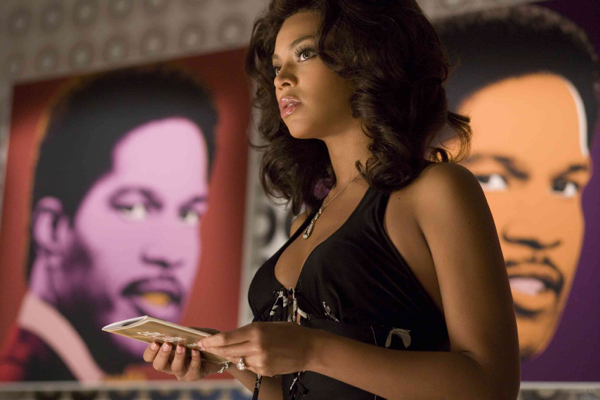Movie review by Greg Carlson
Many admirers of Jennifer Hudson’s breakthrough performance in “Dreamgirls” might be simultaneously thrilled at her Golden Globe win and perplexed that it was bestowed for work in a supporting role category. Her presence in the screen translation of the Tom Eyen/Henry Krieger Broadway show commands our attention at every turn and functions as the movie’s core. Yes, the players form an ensemble, but it doesn’t take much to argue that Hudson could just have easily been awarded as a lead. By the time she belts the powerhouse tearjerker “And I Am Telling You That I’m Not Going,” she’s utterly taken control of the movie.
Despite not winning best musical when it debuted in the early 1980s, “Dreamgirls” snared half a dozen Tony awards and developed into a well-loved show. Filmmaker Bill Condon, who tackled the screenplay for the feature film adaptation of “Chicago,” as well as helmed interesting projects like “Kinsey” and “Gods and Monsters,” wears both hats on “Dreamgirls” and he excels at each task. The movie version of “Dreamgirls” occasionally reminds viewers that some things might work better with the immediacy and urgency of live performance, but like the finest Broadway to Hollywood translations, “Dreamgirls” regularly manages to work as a movie while maintaining an essential fidelity to the source material.
Even for folks unfamiliar with the basic plot, “Dreamgirls” will ring some bells. A thinly veiled spin on the story of the Supremes, “Dreamgirls” charts the meteoric showbiz ascendancy of an African-American “girl group” that crosses over from regional popularity in Detroit (transposed from the play’s original Chicago setting) to connect with white audiences. The issue of race is cannily addressed throughout the movie, reiterating the frustration of artists who saw their vibrant contributions to popular song pigeonholed as “race records” while bland covers by white artists dominated the charts and airwaves and sold millions of copies. As a Berry Gordy-esque manager, Jamie Foxx has the difficult task of playing a character caught between his desire to appeal to the broadest possible audience while avoiding his performers’ accusations that he’s selling out.
Once Hudson’s Effie is demoted from lead vocals to singing backup, some of the story’s energy shifts to the less worldly Deena, and Beyonce Knowles finally has a role worthy of her talent. While Deena, who suffers some tremendously spiteful comments from Foxx’s Curtis, is in many ways a less interesting character than Effie, Knowles fits perfectly into the Diana Ross mold, and fans will thrill at the way in which a seemingly endless parade of Ross-like costumes, hairstyles, and even musical phases and trends are dazzlingly replicated.
Appearing alongside the younger performers are veterans Danny Glover and Eddie Murphy, who are both warm and memorable in their respective parts. Murphy, as James “Thunder” Early, knocks one out of the park, lighting up his character with a combination of moves and traits borrowed from the likes of James Brown, Wilson Pickett, Jackie Wilson, and Marvin Gaye, among others. While a number of alterations have been made to the original property, including a quartet of tunes written just for the film, Condon’s version of “Dreamgirls” will likely appeal to a new generation of fans, some of whom might even feel compelled to seek out the original cast recording to hear for themselves how Jennifer Hudson stacks up against Jennifer Holliday.
